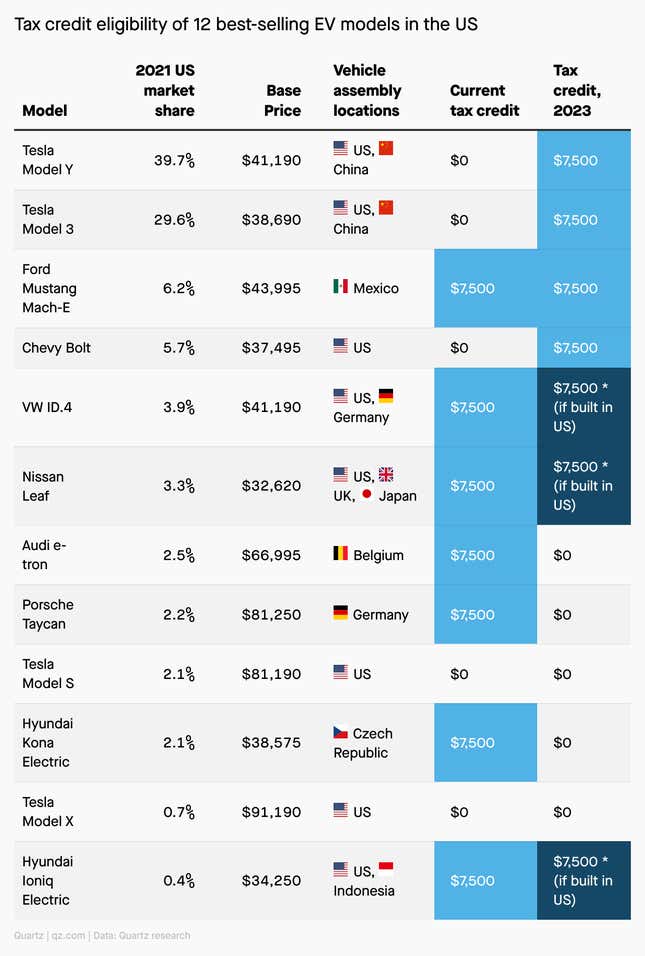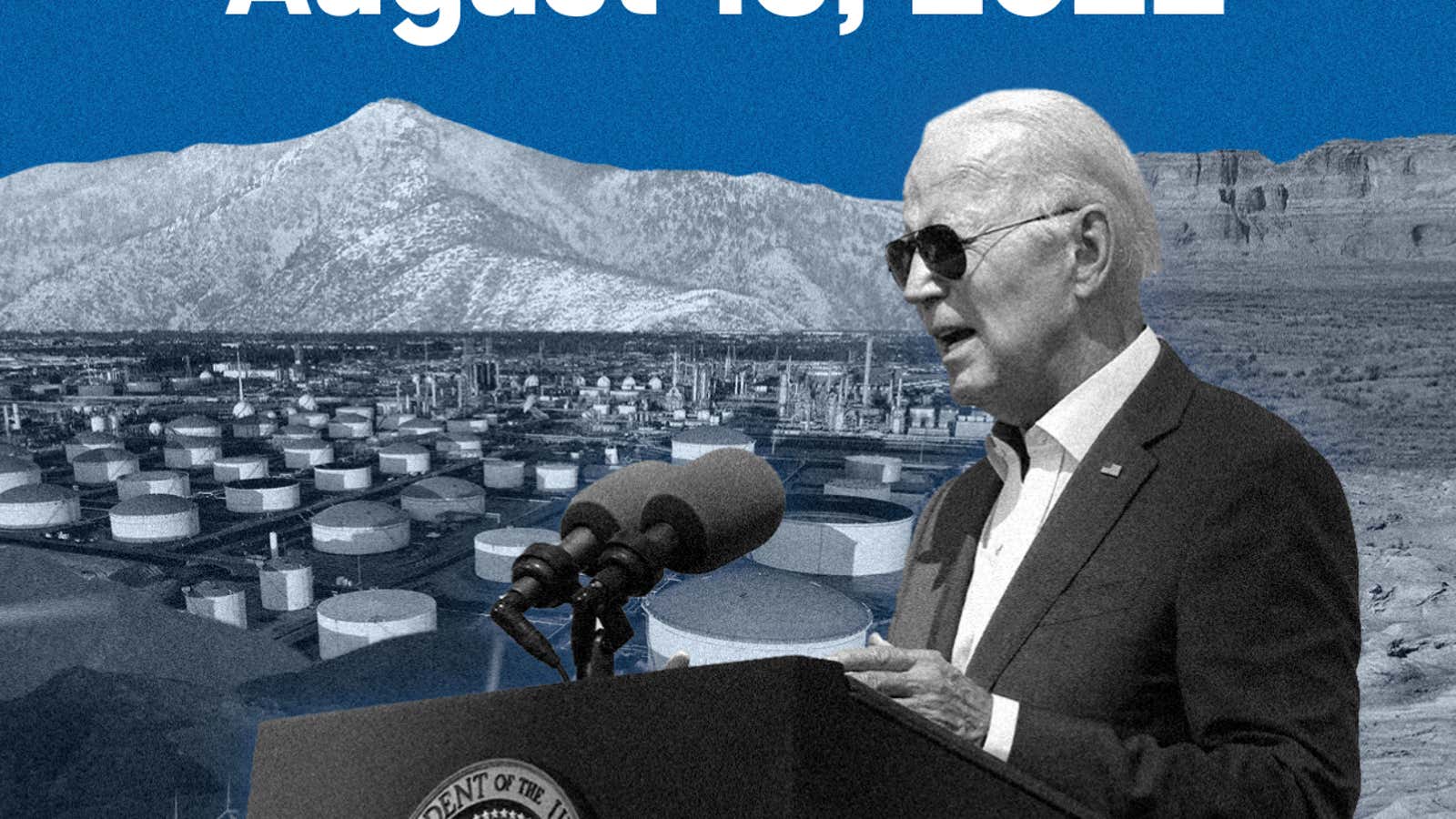Hi Quartz members,
On Friday (Aug. 12), the House of Representatives passed the biggest climate bill in US history, clearing the way for a clean tech boom that is expected to create millions of jobs, save consumers money on energy bills, and deeply slash greenhouse gas emissions. Through $370 billion in tax rebates, grants, and loans, the Inflation Reduction Act (IRA) is poised to break the logjam that has left US climate tech companies struggling to compete on the global stage.
Climate tech in the US—companies that deal in renewable energy, electric vehicles, and the like—has long faced two major challenges. One is scaling: There’s plenty of cash from universities, the government, and Wall Street to support research and innovation, but much less for facilities to build clean tech at scale. So intellectual property conceived in the US at taxpayer expense often winds up exported to manufacturers in China and elsewhere. The second is unpredictable tax policy. Subsidies for renewables have traditionally needed reapproval from Congress every few years, leaving executives biting their nails and struggling to secure affordable, reliable private financing.
The IRA legislation—coming on top of climate provisions in a new microchip bill Biden signed on Aug. 10 and the $1 trillion infrastructure package from last November—remedies both concerns. The bills “rewire the economy in all sorts of ways that will enable US clean tech to finally compete with—and beat—China,” said Josh Freed, senior vice president for climate and energy at the think tank Third Way.
Tax incentives are now bigger and cover more subsectors; they’re designed to beef up domestic manufacturing, and they will be locked in for a decade. Climate tech companies are chomping at the bit to exploit that certainty to tap a vast, previously inaccessible pool of private tax equity financing, said Danny Kennedy, CEO of New Energy Nexus, a network of climate startup incubators.
There will be bumps ahead, including geopolitical tensions with China, the slow pace of permits for new infrastructure, hiring and training workers, and the need to educate a generation of climate tech nerds on the new resources available to them. But at the least, Biden has succeeded in lifting the psychic burden of constant policy anxiety that has weighed down US climate companies for a decade.
“Candidly, I just want to stop thinking about this,” said Dan Patry, policy innovation manager at the energy storage company Fluence. “I’m really excited to get across the finish line and actually do the work.”
A ROSE, BY ANY OTHER NAME
The Inflation Reduction Act is not an inflation reduction act. Which is to say: The law is likely to result in lower prices for consumers over the years, but its intent is unmistakably to get the US moving on clean energy and climate change. The name fools no one who reads about the bill, but it allows formerly intransigent legislators like Joe Manchin, the West Virginia senator, to pretend they’re voting for affordable living and not giving in to climate change activism. But did Manchin only yield because of this cosmetic change? The economist Adam Tooze figures Manchin recognized that climate action is good politics, “even in West Virginia.”
⛳ We’d love your feedback on Quartz’s membership, because we’re always looking for ways to improve and make the experience better for you. Please let us know your thoughts in this brief survey–three minutes or less, we promise! The survey is here. Thank you, in advance, and thank you for reading!
THE ELECTRIC COMPANIES
If you’re in the market for an EV, which one should you buy? At least a part of your answer will be determined by the IRA’s new tax credit rules, which make some cars cheaper and others more expensive. At present, cars like the Tesla Model 3 and the Chevy Bolt, which have sold more than 200,000 units apiece, are no longer eligible for any tax credits. Next year, though, the IRA will eliminate that sales cap–but put other regulations in place.
To qualify for a tax credit under the IRA, vehicles must be under a certain price ($80,000 for trucks and SUVs and $55,000 for all other categories) and buyers must earn less than $150,000 if single or $300,000 as a household if married. Eligible vehicles must be assembled in North America. And starting in 2024, qualifying vehicles must have batteries assembled in North America and built using minerals mined or processed in that region or a country with which the US has a free trade agreement.

The bulk of EVs sold in the US today–which comprise two Tesla models and the Chevy Bolt–would qualify for a tax credit next year. But the real sticking point will come when the battery sourcing requirements kick in. The vast majority of battery metal mining and assembly happens in China (and other countries with which the US does not have a free trade agreement). Setting up new supply chains for batteries could take years, so most EV tax credits are at risk of lapsing in 2024, unless this rule is defanged or delayed.
BY THE NUMBERS
21%: The projected reduction in US greenhouse gas emissions in 2030, thanks to the IRA.
$170-$220: Projected annual reduction in average US household energy spending by 2030 as a result of efficiency upgrades and lower-cost electricity from renewables.
$85: Tax rebate per ton of CO2 captured from a smokestack or other source and buried, up from $50 under previous law.
$62 billion: Grants, loans, and subsidies to support domestic manufacturing of renewables, batteries, electric vehicles, and other clean tech hardware.
$14,000: Maximum rebate per household for home electrification upgrades like heat pumps and electric stoves.
$40 billion: Additional loan guarantee authority available for clean energy projects through the Loan Program Office, an obscure but well-endowed Department of Energy agency that gave Tesla some of its earliest backing.
$700 million: Funding for domestic production of high-assay low-enriched uranium, the fuel for advanced nuclear reactors that is currently only available from Russia.
ONE ⛽ THING
The political battle to pass the IRA meant that the Biden administration had to build concessions for the fossil fuel industry into the bill. One of them requires the government to auction oil and gas leases in the Gulf of Mexico and Alaska. Another provision compels the Department of the Interior to offer two million acres in onshore land and 60 million offshore acres on lease each year for the oil and gas industry. Activists have called this a “climate suicide pact,” but some analysts think that the fossil fuel giants may not be as keen to develop these areas as we might fear. The concessions may make the IRA imperfect, but it is nonetheless indispensable.
QUARTZ STORIES TO SPARK CONVERSATION
- India has a term for Europe’s planned power outages this winter: “load-shedding”
- Chipotle’s $20 million settlement with workers is an indictment of the entire restaurant industry
- Air travel is back for tourists, but not for business travelers
- Disney has finally surpassed Netflix in overall streaming subscribers
- How sustainable are the contents of your shopping cart? A new database has answers
- Is padel tennis the next pickleball?
5 GREAT STORIES FROM ELSEWHERE
🍃 Modeling emissions. After the “Inflation Reduction Act” was introduced in Congress, there was a race to calculate the legislation’s climate impact. Some estimates predict that by 2030 it could reduce CO2 emissions by about 40%. Scientific American and E&E News go into who makes these calculations, to what extent they are accurate, and where emissions modeling can fall short, especially given inevitable stumbling blocks during implementation.
😜 Mischief makers. Troublemaking can often be amusing to observers, even when it is transgressive. This has prompted Alex Moran, an Oxford philosopher, to ponder whether any praiseworthy qualities can be attributed to the world’s wits and pranksters. In a piece for Aeon, Moran gives examples from history and compelling reasons for why mischief is more important than one might think.
🤖 iRobot acquired. Earlier this month, Amazon bought iRobot, the maker of the floor-scuttling Roomba, for $1.7 billion. The takeover is about more than vacuum cleaners, according to Whole Foods CEO John Mackey. In a piece for Nasdaq, he explains why this move is likely part of Amazon’s larger strategy to automate its business, especially in warehouses, and in many ways mirrors its acquisition of Whole Foods in 2017.
🐟 Seems fishy. Fish oil has been hailed as a holy grail for everything from diabetes to heart disease to cancer. But despite those claims, it’s still not exactly clear what the oil does for health (though it has lined pockets in the billion-dollar supplements industry). Now research has taken a new twist, as The Atlantic explains, when a fishy study funded by big pharma produced some head-scratching results.
🕺 Sookoo takes TikTok. Chutney soca is a type of music found in Trinidad and Tobago, Suriname, and Guyana, mixing together soca beats and calypso with Hindi and English lyrics. Now the music has gone viral on TikTok. That is thanks in part to Trinidadian musician Vedesh Sookoo, writes gal-dem. His song, “Meat is for Man,” has racked up over 100 million views on TikTok and Instagram and won the hearts of Gen Z.
Have a green, clean weekend,
—Tim McDonnell, climate reporter, and Nicolas Rivero, tech reporter
Additional contributions by Julia Malleck, Alex Citrin-Safadi, and Samanth Subramanian
